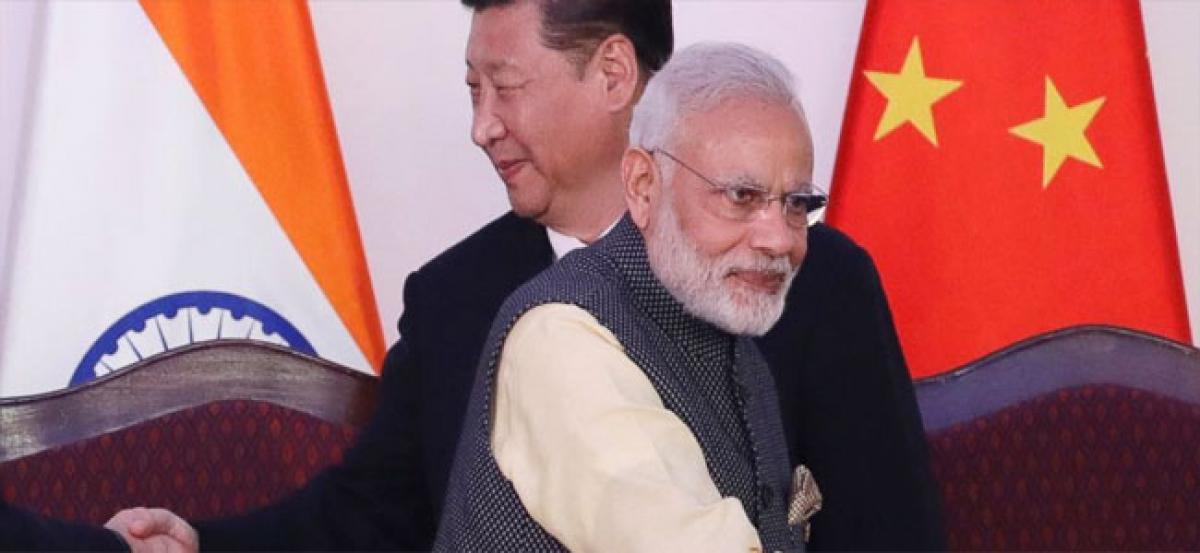Live
- Philippines orders full evacuation amid possible volcanic re-eruption
- Government Prioritizes Welfare of the Poor, says Dola Sri Bala Veeranjaneyaswamy
- Two Russian oil tankers with 29 on board damaged due to bad weather
- Telangana's Traditions Will Be Protected, Village by Village : BRS Leader MLC K. Kavitha
- Uganda to relocate 5,000 households from landslide-prone areas in eastern region
- Harish Rao Criticizes CM Revanth Reddy: "His Time is Over"
- Vijay Sethupathi Hails 'Vidudala-2' as a Theatrical Game-Changer
- Sahaj Yog: A Path to Inner Transformation and Harmony City takes giant strides
- Allu Arjun meets his uncle Nagababu at his residence
- J&K L-G felicitates Langar organisations & NGOs for contribution during Amarnath Yatra
Just In

Accustomed as we are to shrill hyperbole in India\'s public discourse, the description of the tense Himalayan face-off as the \"incident at Doklam\" and its denouement as \"expeditious disengagement of border personnel\" by the Ministry of External Affairs came across as refreshing examples of phlegmatic understatement.
With bizarre perversity, we have been spurning the huge window, into China, that a willing and cooperative Taiwan has been offering to us, for years. We need to stop groping in the dark and create strategies to counter China's long-term intentions
Accustomed as we are to shrill hyperbole in India's public discourse, the description of the tense Himalayan face-off as the "incident at Doklam" and its denouement as "expeditious disengagement of border personnel" by the Ministry of External Affairs came across as refreshing examples of phlegmatic understatement.
The diplomatic finesse shown by India stood in stark contrast to the Chinese spokesperson's gauche declaration that India had "pulled back all the trespassing personnel and equipment".
Doklam was, by no means, India's last confrontation with China and there is, thus, no cause whatsoever for our soldiers, diplomats and political leadership to become complacent – for four reasons.
Firstly, our 1962 military defeat was due to the egregious misreading of China's intent by India's political leadership. Fifty-five years on, clarity and resolve are still lacking vis-a-vis our strategic stance and policies towards an increasingly bellicose China. With bizarre perversity, we have been spurning the huge window, into China, that a willing and cooperative Taiwan has been offering to us, for years.
We need to stop groping in the dark and create strategies to counter China's long-term intentions. Secondly, China, translating its enormous economic gains into coercive military power, expects neighbouring nations to voluntarily submit to Chinese hegemony.
PLA Colonel Liu Mingfu's 2010 book, "China Dream", provides many pointers. It defines China's national goal as to become "number one" in the world, but rejecting the "peaceful rise" thesis, it advocates a "military rise" along with its "economic rise." A part of the "Chinese dream of national rejuvenation" is the establishment of a "unified global system", or Empire, termed tianxia in Mandarin. Order, in this system, is maintained under the aegis of a hegemon state, which dominates by virtue of its acknowledged superiority.
The Chinese counterpart of shatranj is the game of "wei-qui", based on "surrounding pieces" and "strategic encirclement". Opponents seek empty spaces and building up of strength, surrounding and capturing opposing pieces. While chess encourages single-mindedness, wei-qui generates strategic flexibility. Let us learn to play wei-qui.
Thirdly, while patting ourselves on the back for deft diplomacy, let us not forget that we have had a close call. While our gallant armed forces could certainly have given a "bloody nose" (so eagerly sought by militant TV anchors) to the PLA on many fronts, a general war or even a limited clash would have been equally damaging to both nations and their economies.
Avoiding knee-jerk responses, let us undertake long-term measures to ensure that our armed forces are always equipped and ready to fight a 30-day "intense war".
Finally, while the vision of China's grandiose, "one-belt one road" (OBOR) may be impressive as well as intimidating, the project relies on ports, seaborne commerce and sea lanes. India's non-participation in the project is already causing concern in Beijing.
Chinese President Hu Jintao's famous reference to the "Malacca dilemma," which acknowledged the vulnerability of China's seaborne trade and energy, was, no doubt, rooted in India's dominant oceanic location and the possibility of trade warfare being waged by the Indian Navy. India must do everything to keep Hu Jintao's nightmare alive.
By Admiral Arun Prakash (Retd)

© 2024 Hyderabad Media House Limited/The Hans India. All rights reserved. Powered by hocalwire.com







